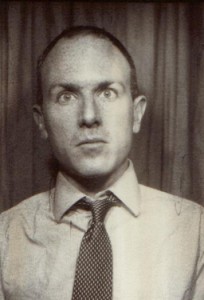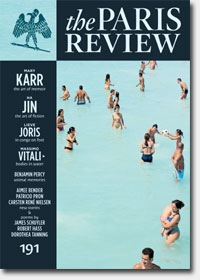On Friday, the Paris Review announced that Lorin Stein, a noted editor at Farrar, Straus & Giroux, would become its new editor, succeeding Philip Gourevitch. But the impact of Stein’s departure from FSG remained curiously unexamined. For one thing, was Stein definitely leaving FSG? Or was he staying on in a part-time capacity? And who were some of the other candidates? (Moby Lives has put forth Meghan O’Rourke as one of the contenders.)
 This correspondent contacted Mr. Stein in an effort to determine answers to some of these questions, putting forth a number of inquiries concerning the Paris Review hiring process, whether or not Mr. Stein felt that he clinched the job during that vital first interview (thus following the advice often found on career-oriented websites), the degree to which Mr. Stein planned to break from or carry on Philip Gourevitch’s legacy, whether or not there was any hazing ritual involved in getting the new job, and what will happen to the authors whom Mr. Stein has edited at FSG. On these vital points, Mr. Stein insisted that he had “no good answers.” But he was generous enough to provide a few answers to other questions. The results can be found below.
This correspondent contacted Mr. Stein in an effort to determine answers to some of these questions, putting forth a number of inquiries concerning the Paris Review hiring process, whether or not Mr. Stein felt that he clinched the job during that vital first interview (thus following the advice often found on career-oriented websites), the degree to which Mr. Stein planned to break from or carry on Philip Gourevitch’s legacy, whether or not there was any hazing ritual involved in getting the new job, and what will happen to the authors whom Mr. Stein has edited at FSG. On these vital points, Mr. Stein insisted that he had “no good answers.” But he was generous enough to provide a few answers to other questions. The results can be found below.
Editing a major literary quarterly involves a different set of responsibilities than editing a book. The deadlines are often tighter. The need to be current is a more pressing concern. Factor in ebooks, all these book blogs, and wisecracking interviewers, and the media landscape becomes nearly Gormenghastian. Small wonder that so many in the book biz are fond of drink. How do you plan to change your present practices to fit within these new needs? Or do you feel that your equipoisal endeavors with the red pen across numerous titles at FSG offers enough of a transitional overlap?
It’s true that magazines come out much faster than books. The amount of time it takes to publish a book–almost a year in most cases–is immensely taxing to the author and to anyone who cares about the author, the editor included. It’s like waiting for your birthday when you’re a kid. I’m looking forward to the change of pace.
N.B. I use a number two pencil. (See, I’m transitioning already.)
You described The Paris Review as “a gateway drug” to the New York Times. But I don’t see the addictive possibilities fully explored at the Paris Review site. Are there any plans to expand the Paris Review‘s online offerings? Perhaps offering full-blown access to the backlist for subscribers like Harper’s or the New Yorker?
We do intend to expand the site–that’s something I am very excited about. Stay tuned.
The Paris Review publishes some of the best author interviews known to humankind. Are there any plans to shake up the interview formula? Perhaps offering more audio and video to capture these conversations?
Aren’t the interviews wonderful? Think of the ones with P.G. Wodehouse, Philip Larkin, Henry Green, Hemingway — I wouldn’t wish for video, even if it could be had. And I feel the same way about Nat Rich’s recent interview with James Ellroy. It’s a work of art in itself. (And it’s very funny.)
That said, it will be fun to explore all sorts of things in connection with the site. Again, I say stay tuned!
How will FSG be defined by your absence?
For the last sixty years FSG has been one of the best houses in the country — in the world. It has been the biggest privilege of my life to work there. The authors I’ve worked with are, in many cases, writers signed up, nurtured, and edited for years by my boss, Jonathan Galassi. Whatever I know about editing and publishing I’ve learned from him–and from my friends in the editorial, publicity, sales, and art departments. I am very much a junior member of that team. I hope my friends miss me, authors and colleagues both, because I’m going to miss them badly. But there’s no question of the place being defined one way or another by me. The influence is entirely the other way round.
George Plimpton was a boxer. Gourevitch reported on Rwanda. What macho qualities do you bring to the role of Paris Review editor?
My sister likes to say I’m “comfortable in [my] masculinity” — meaning I act like a girl.
 With both literary journals facing financial difficulties in a tough economy, incoming Paris Review editor Lorin Stein announced this morning that his quarterly would be merging with Granta to form a new publication called The Grantaris Review.
With both literary journals facing financial difficulties in a tough economy, incoming Paris Review editor Lorin Stein announced this morning that his quarterly would be merging with Granta to form a new publication called The Grantaris Review.  This correspondent contacted Mr. Stein in an effort to determine answers to some of these questions, putting forth a number of inquiries concerning the Paris Review hiring process, whether or not Mr. Stein felt that he clinched the job during that vital first interview (thus following the advice often found on career-oriented websites), the degree to which Mr. Stein planned to break from or carry on Philip Gourevitch’s legacy, whether or not there was any hazing ritual involved in getting the new job, and what will happen to the authors whom Mr. Stein has edited at FSG. On these vital points, Mr. Stein insisted that he had “no good answers.” But he was generous enough to provide a few answers to other questions. The results can be found below.
This correspondent contacted Mr. Stein in an effort to determine answers to some of these questions, putting forth a number of inquiries concerning the Paris Review hiring process, whether or not Mr. Stein felt that he clinched the job during that vital first interview (thus following the advice often found on career-oriented websites), the degree to which Mr. Stein planned to break from or carry on Philip Gourevitch’s legacy, whether or not there was any hazing ritual involved in getting the new job, and what will happen to the authors whom Mr. Stein has edited at FSG. On these vital points, Mr. Stein insisted that he had “no good answers.” But he was generous enough to provide a few answers to other questions. The results can be found below.